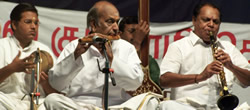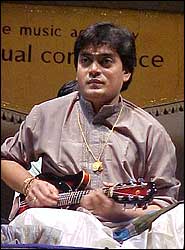The
Madras Season of 2003/04:
A Searchable
Database of Featured Ragas, Composers, and Compositions
 For
approximately one month each year, the South Indian
metropolis of Chennai
(formerly Madras) becomes the most concentrated hub of
musical activity on the globe. The so-called “Madras Season”
is not a centrally organized festival but an almost feverish
schedule of concurrent concert series sponsored by scores
of private cultural societies or “sabhas.” For
approximately one month each year, the South Indian
metropolis of Chennai
(formerly Madras) becomes the most concentrated hub of
musical activity on the globe. The so-called “Madras Season”
is not a centrally organized festival but an almost feverish
schedule of concurrent concert series sponsored by scores
of private cultural societies or “sabhas.”
The “Season”
can trace its roots back to 1927 when, after a series of “All-India
Music Conferences” in North India (1916-25), a similar
conference was organized in the South (in conjunction with
a political conference of the Indian National Congress party).
Part music festival, part academic conclave, this conference
established the pattern of great musicians and scholars converging
on the city during the delightful month of December for an
intense season of music-making. Today, over two thousand concerts
and recitals, sponsored by sixty or more sabhas, fill the
city with the sounds of classical South Indian (Carnatic)
music.
 Not only is the
Madras Season an ideal occasion for music lovers to have an
intense, concentrated experience with Carnatic music, it also
provides a unique opportunity to observe current developments
in this rich culture, in terms of what music is performed
and what features this music displays. Using a statistically
significant sample of concerts during the 2003/04 season –
almost 15% of more than 2000 concerts, attended by a team
of more than twenty assistants – this project provides
ample raw data for observing the prevalence of certain ragas,
the popularity of certain compositions, and the prominence
of certain composers. Providing an empirical look at a large
sample of performances during a restricted timeframe, the
resulting database promises to provide a good snapshot of
current performance practice in the Carnatic music world. Not only is the
Madras Season an ideal occasion for music lovers to have an
intense, concentrated experience with Carnatic music, it also
provides a unique opportunity to observe current developments
in this rich culture, in terms of what music is performed
and what features this music displays. Using a statistically
significant sample of concerts during the 2003/04 season –
almost 15% of more than 2000 concerts, attended by a team
of more than twenty assistants – this project provides
ample raw data for observing the prevalence of certain ragas,
the popularity of certain compositions, and the prominence
of certain composers. Providing an empirical look at a large
sample of performances during a restricted timeframe, the
resulting database promises to provide a good snapshot of
current performance practice in the Carnatic music world.
This DATABASE
-- over 2400 compositions from almost 300 concerts -- is made
available here to all alike – scholars, performers,
rasika – in the hope that this information may be of
interest and use. While the compilers of this database present
their own observations, each user is encouraged to explore
the data for him/herself and to draw one’s own conclusions.
Especially in the areas of concert structure and raga use,
this information may prove instructive for future repertoire
selection.
|
|
